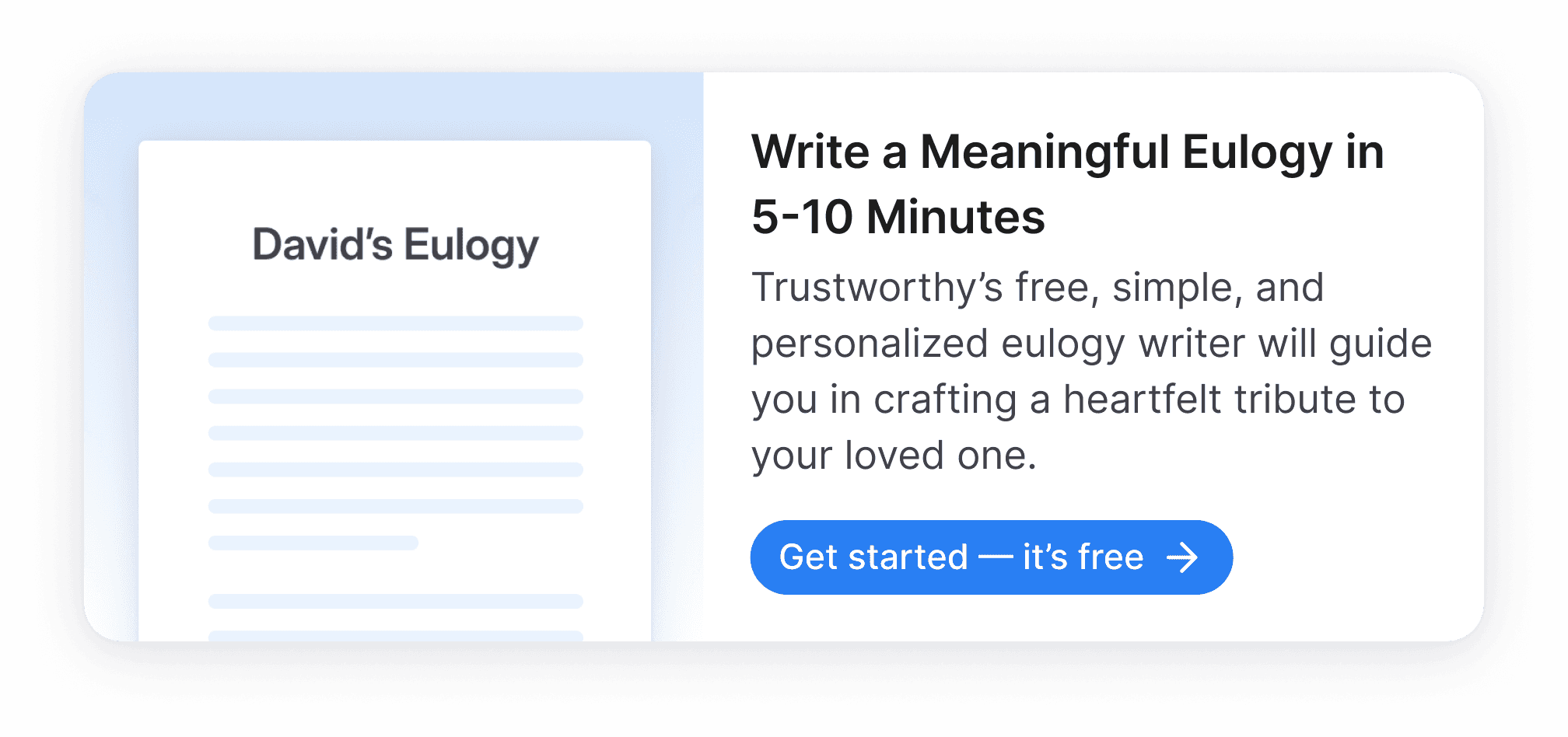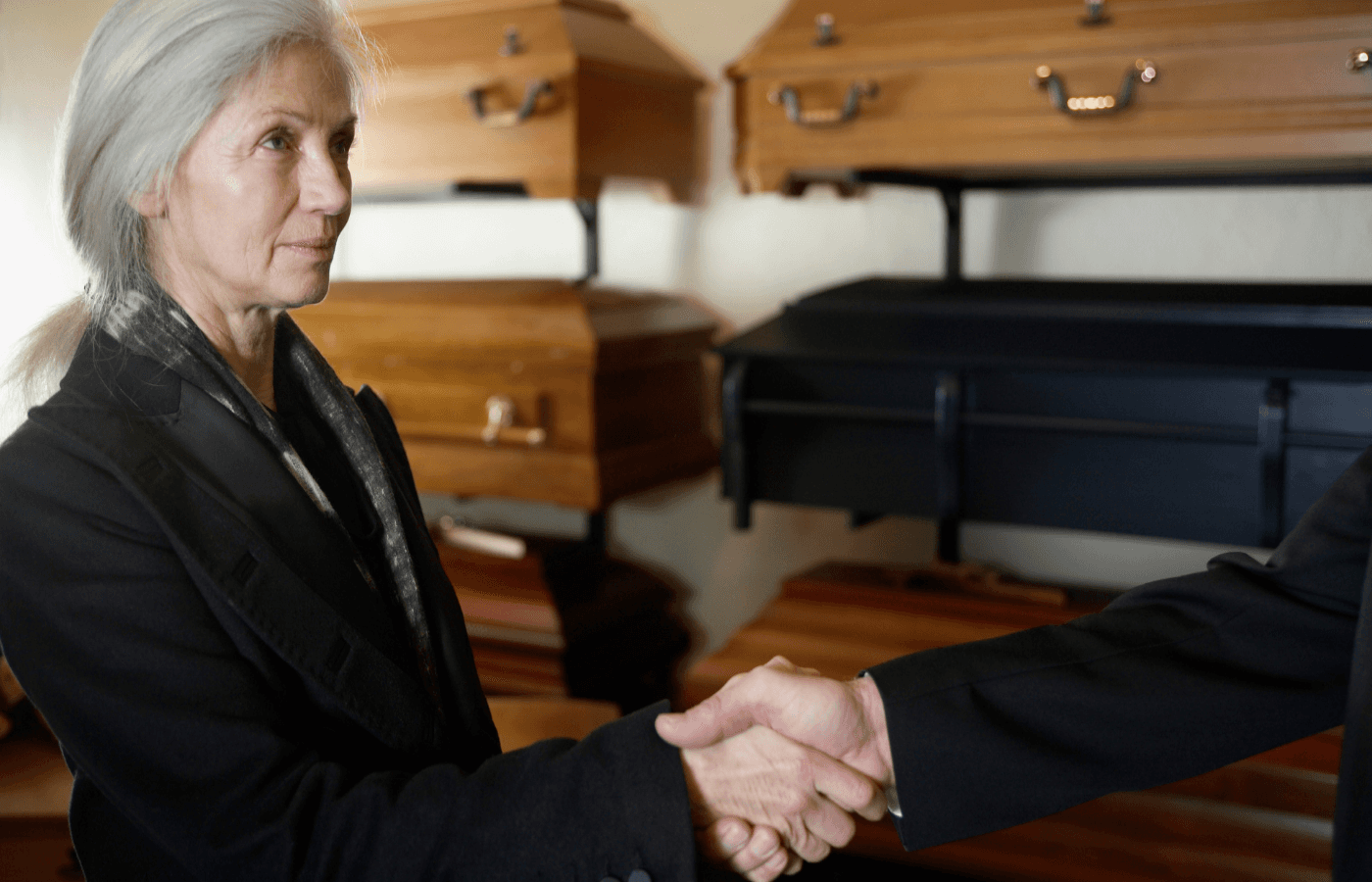Planning a funeral for your loved one is a very emotionally and physically tiring activity. Unless the funeral is pre-arranged, there are so many tasks to take care of. So, how long does planning a funeral actually take?
To help you navigate this tough time, we put together a guide on a general funeral planning timeline. We’ll explain when to start arranging the funeral services, give some helpful tips, and explain how to stay organized using Trustworthy during the process.
Key Takeaways
Funeral planning processes can take anywhere from a few days to a month.
The type of funeral, religious considerations, family preferences, budgeting, legalities, and unforeseen circumstances will influence how long the planning takes.
You can start funeral arrangements days after the deceased passed away. They’re generally not delayed for an extended period.

How Long Does Funeral Planning Take?
While there is no set timeline for funeral planning, the amount of time depends on a number of different factors. The process can last anywhere from a day to a little over a week.
Steve Spann, owner of Spann Funeral Home, says:
“Planning a funeral is much like planning a wedding. There are a number of major details that must be worked on or worked out prior to the service time arriving, but in the funeral setting, you only usually have a few days to do this.”
One of the most time-consuming parts of funeral planning is all the administrative work. You must email and phone people, wait for responses, fill out documents, make payments, and make arrangements with multiple people and places.
Being disorganized is a time killer and makes the overall process more unpleasant and stressful. Using a family-operating system like Trustworthy can help smooth the entire planning process. You can store all your important documents in one secure location on your phone or computer. If you plan with others, the collaboration features are useful and time-saving.
Here are some factors that influence how long the planning process will take:
Type of Funeral Service
The type of funeral affects how long it will take. You can choose from many different services, like a traditional funeral that includes a public viewing and graveside services.
There are open and closed-casket funerals and also special ceremonies where the cremated remains of the deceased are scattered in a chosen area.
The size of the funeral also affects how long the planning process will take. Generally, the larger the funeral, the longer it will take to plan.
Cultural & Religious Considerations
You also want to take various cultural and religious considerations into account. If the deceased openly followed a certain culture or religion, you’ll want to adhere to their traditions. However, whatever type of service you choose, it’s good practice to be mindful of other family members and friends.
Consider the people attending the service. Is there anything that may make them uncomfortable? For example, in some religions or cultures, certain traditions may seem strange or offensive to others.
We aren’t suggesting making the funeral non-religious if the deceased was a devout Catholic. However, think about how the deceased's family members feel about these choices. Considering everybody’s cultural and religious opinions can take up time, especially if there are many.
Family Preferences
You will also likely need to take into account any family preferences when planning the funeral. It’s not uncommon for families to have disagreements, as some people may prefer a closed casket service while others may want an open casket or graveside ceremony.

One family member may wish to include a religious passage, while another may not have anything religious involved in the funeral.
Remember, while you should consider your family’s preferences and ideas, you don’t necessarily have to agree with them.
Budget Planning
Planning a funeral comes with an added financial aspect you must consider before planning the funeral process. Budgeting your planning before you start will save you time and money in the long run.
By setting out your budget, you should begin to get an idea of what needs to be done and how long it will take.
Keeping track of quotes and costs is important when planning a funeral. Organizing everything on Trustworthy will save you the hassle of hunting down missing documents and important information.
Legalities
The legalities of funeral planning can take the longest, depending on various factors. For example, if you want to have the body released from the state morgue, you will need a death certificate, and you will also need to apply for a burial transit permit. This permit is only issued after the death certificate is complete. This process alone can take anywhere from three business days to three weeks.
Coordinating with a Funeral Service
Coordinating with a funeral service removes a lot of the emotional burden of planning but also speeds up the process.
When choosing a funeral service to work with, check out their rates and reputation first. Consider what services they offer and whether their views align with yours. This will make the entire planning process a lot smoother.
When coordinating a funeral service, you must be open and honest with your communication to ensure there are no errors and you carry out the deceased’s wishes.
Travel Distances
How long it takes to plan a funeral also depends on the travel distances from family members to the funeral venue. Suppose you host the funeral in a location that is quite a distance from where family members live. Making travel arrangements can take time, especially if you provide assistance with accommodations.
Emotional Toll
Planning a funeral for a loved one takes a heavy emotional toll, which can affect the speed of your planning. Deaths that were sudden or particularly traumatic can make it even more difficult to focus or make decisions while in such a heightened emotional state.
Unforeseen Circumstances
Even the most organized person can suffer setbacks due to unforeseen circumstances. Some of these circumstances can be changes in local laws and requirements, which can cause a delay in obtaining permits or other important documents. Sudden deaths with no pre-arranged funeral plans can result in depleted funds, which can bring funeral planning to a halt.
These factors influence how long it will take you to plan a funeral. To keep the process as smooth sailing as possible, you should use Trustworthy to help you plan and organize all aspects of a funeral.
How Long Should You Wait Before Arranging a Funeral Service?
After the death of a loved one, many people wonder how long they should wait before planning the funeral service. Is there such a thing as too much or too little time? There is no right or wrong answer, as it will depend on preservation methods and deciding who or which funeral home will carry out the planning.
Most people start arranging the funeral service relatively soon after the death of a loved one because there is only so much time the funeral home or morgue can preserve the body. While technologies have improved these preservation methods, most people want to get started on the planning process right away.
Depending on how long the body can be held and the family circumstances, most people will typically arrange the funeral to take place within one or two weeks after the deceased’s passing.
Is There a Way Around Funeral Planning?
Planning a funeral while grieving is very stressful. If the deceased pre-arranged their funeral beforehand, the financial burden and additional emotional turmoil are removed.
By pre-planning the funeral, none of the decision-making falls on your shoulders because it’s all done for you. Some funeral homes offer a prepaid service where a person pays an amount in advance to the policyholder. The funeral home only uses the money to carry out their funeral plans.
The funeral home adheres to the instructions and wishes of the deceased when arranging the service. Not only does this remove the added stress, but it also speeds up the planning process, especially if you want to hold the service a week after your loved one’s passing.
Tips for Planning a Loved One’s Funeral

If you’re the one planning your loved one’s funeral, here are some tips you may find helpful.
Gather Important Information
You need to start by gathering all important information about the deceased, like important documents such as marriage certificates, wills, investments, banking information, and insurance policies.
It’s a good idea to keep all these documents in one easy-to-access spot in case you need them for other planning purposes. Use Trustworthy to store all your confidential information and documents in a secure location where you control who has access.
Consider Any Death Wishes
Make sure to consider the death wishes of your loved one. For example, did they put in any special requests like a favorite song or where they wanted their funeral to take place? This is a good way of honoring their death.
Provide Support
Planning funerals can be a very emotional process, so it’s a good idea to inform your family and friends so that they can give you some emotional support. While you’re gathering information, take a moment to consider how difficult it must be for them as well. Be sure to support them.
Frequently Asked Questions
Do we have more time if we choose cremation over burial?
Yes, you do have more planning time if you choose cremation over burial, as there is only so long they can preserve the body.
Can embalming increase the time you have to plan a funeral?
An embalmed body can stay in the fridge for up to one week after its death, so there’s not much of a big time difference.
What if my deceased loved one was traveling when they passed?
If your loved one passes away outside of the U.S., you will need to contact the U.S. consulate in that country to assist with the arrangements, including shipment and customs clearance.
How long does it take to prepare a body for a funeral?
The embalming process takes around two hours to complete.
What should I expect when planning a funeral?
When planning a funeral, you can expect to feel very emotional or overwhelmed at first, but using an organizational system like Trustworthy can help you through these tough times.
We’d love to hear from you! Feel free to email us with any questions, comments, or suggestions for future article topics.
Trustworthy is an online service providing legal forms and information. We are not a law firm and do not provide legal advice.














